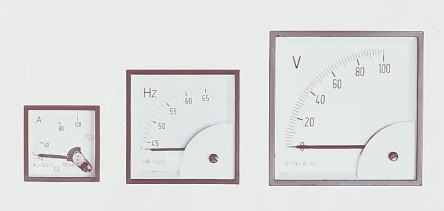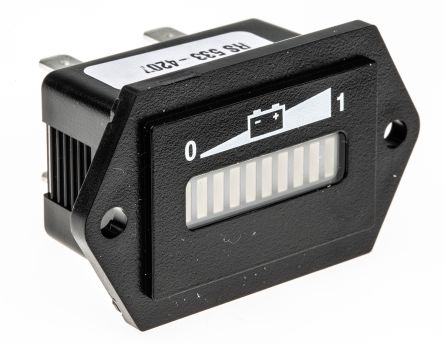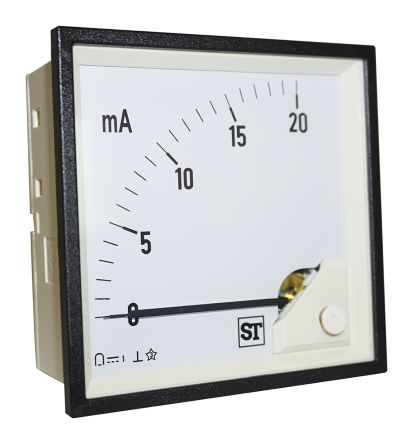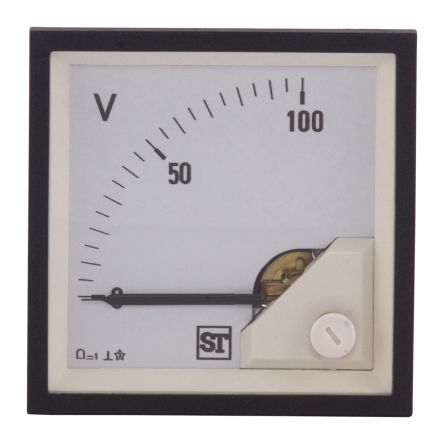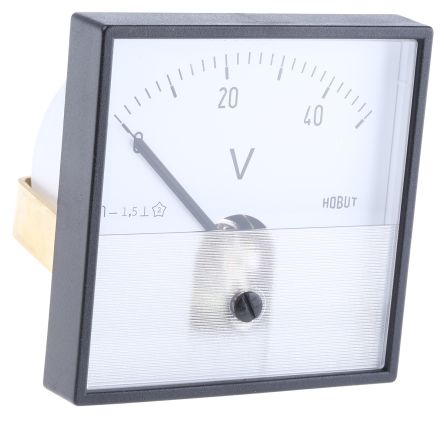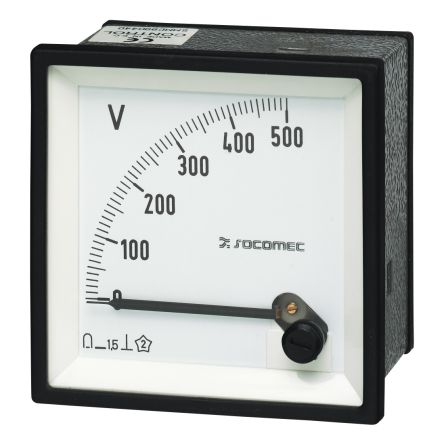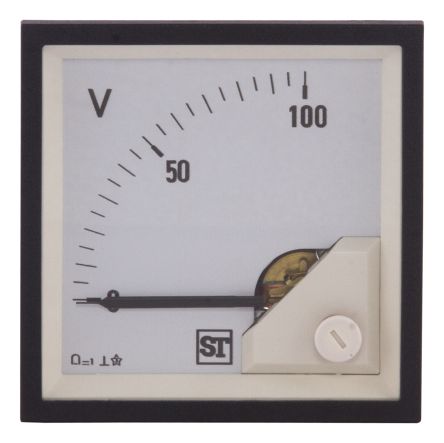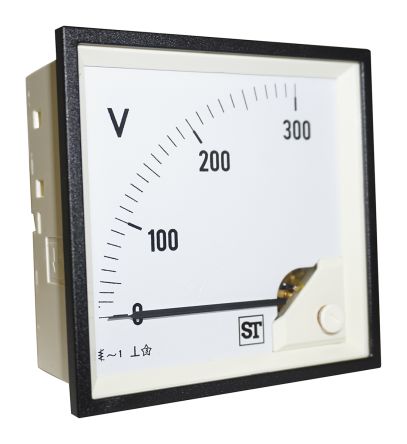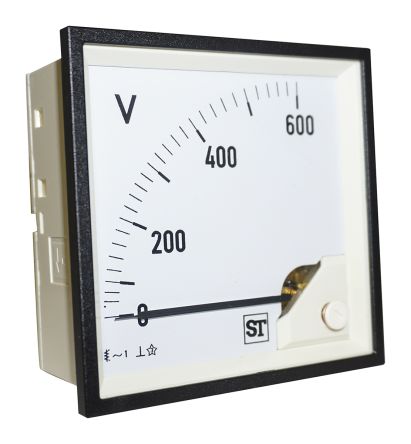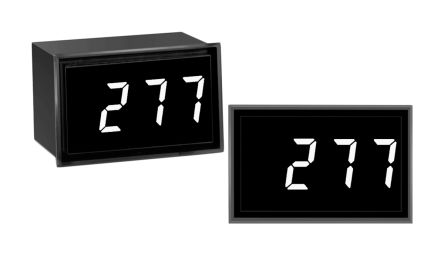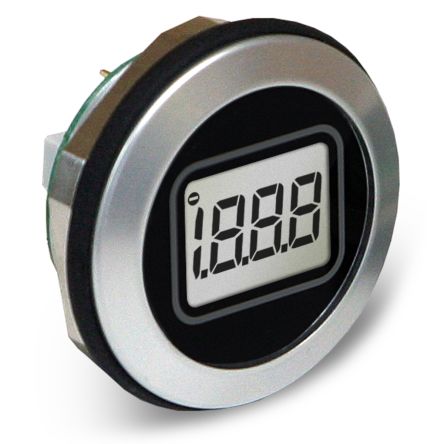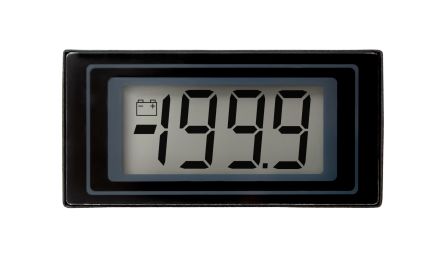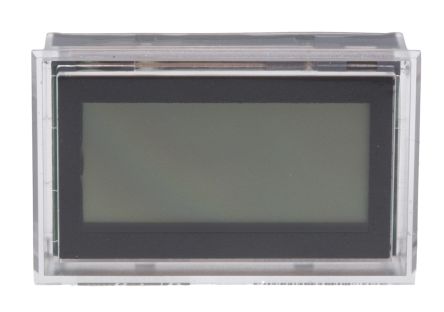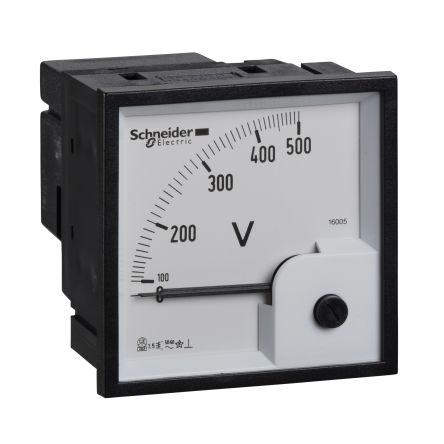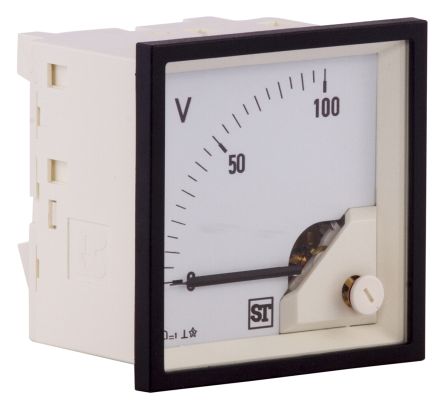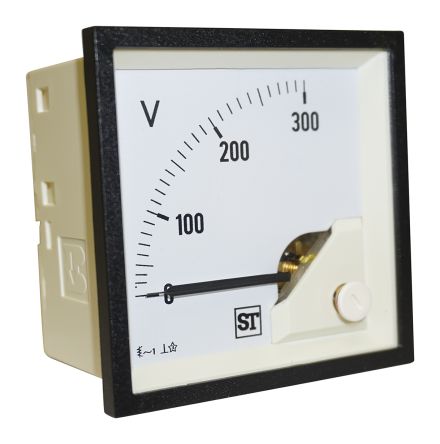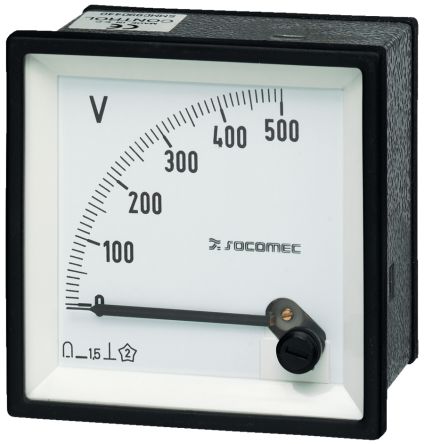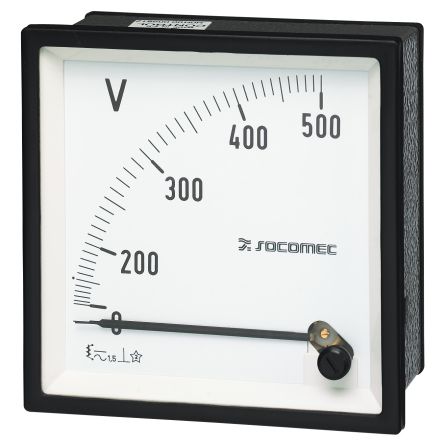- Automation & Control Gear
- Cables & Wires
- Enclosures & Server Racks
- Fuses & Circuit Breakers
- HVAC, Fans & Thermal Management
- Lighting
- Relays & Signal Conditioning
- Switches
- Batteries & Chargers
- Connectors
- Displays & Optoelectronics
- ESD Control, Cleanroom & PCB Prototyping
- Passive Components
- Power Supplies & Transformers
- Raspberry Pi, Arduino, ROCK, STEM Education & Development Tools
- Semiconductors
Voltmeters
Voltmeters, also known as voltmeter gauges or volt testers, are essential instruments used to measure the electric potential difference, or voltage, between two points in an electrical circuit. These voltage measuring devices are widely utilized in both electrical and electronic systems to accurately determine the voltage levels at various locations.
Voltmeter gauges typically feature a numeric display, which can be an analogue needle or a digital readout, indicating the voltage value in volts. They can be designed for specific voltage ranges or offer adjustable settings to accommodate different measurement requirements. Voltmeters can be handheld devices or integrated into larger electrical equipment, playing a crucial role in monitoring and troubleshooting electrical systems.
Key Features of Voltmeters
Voltmeters come with various features that enhance their functionality and usability:
- Display: The display, either analogue or digital, shows the measured voltage value. Analogue voltmeters use a needle or pointer on a scale, while digital voltmeters provide a numerical readout.
- Measurement range: Voltmeters are designed to measure voltage within specific ranges. Some voltmeters have a fixed range, while others offer multiple ranges or auto-ranging capabilities.
- Accuracy: The accuracy of a voltmeter indicates how close the measured value is to the true voltage value. Higher accuracy, such as that of digital voltmeters, is required for critical applications.
- Galvanometer: A galvanometer forms part of the voltmeter’s internal structure, designed to measure very small currents. The galvanometer contains a coil and a magnet passing through this coil.
- Resolution: Resolution refers to the smallest voltage change that a voltmeter can detect and display. Higher resolutions allow for more precise measurements.
- Input impedance: Input impedance is the resistance that the voltmeter presents to the circuit being measured. High input impedance is desirable to minimise the impact of the voltmeter on the circuit.
Some voltmeters may also include additional features, such as data logging, auto-ranging, and connectivity to computers and other devices for data analysis.
Voltmeter Types
Analogue Voltmeter
Analogue voltmeters use a pointer or needle that moves across a scale to indicate the measured voltage. They typically use a moving coil or moving iron mechanism to convert the electrical signal into mechanical motion. Analogue voltmeters are simple and reliable, but may have limitations in terms of accuracy and precision.
Digital Voltmeter
Digital Voltmeters (DVM) provide voltage measurements in numeric form on a digital display. They use analogue-to-digital converters (ADC) to convert the input voltage into a digital signal, which is then processed and displayed. DVMs offer higher accuracy, precision, and resolution compared to analogue voltmeters. They may also include additional features, such as auto-ranging and data logging.
Moving Coil Voltmeter
With either permanent magnets or dynamometers as measuring components, moving coil voltmeters offer the benefit of low power consumption. Moving iron voltmeters can measure both AC and DC currents by producing a deflective torque. The high torque-to-weight ratio of these voltmeters contributes to increased accuracy in readings.
Electrostatic Voltmeter
Electrostatic voltmeters measure current flow based on the attraction, repulsion, or symmetry between two electrically charged plates. One of their key benefits is the high voltage range capacity, often extending up to 200kV.
AC Voltmeter VS DC Voltmeter
While both AC and DC voltmeters measure voltage, they are designed for different types of electrical currents:
- Current type: AC voltmeters measure alternating current (AC) voltage, where the current flow periodically reverses direction. Meanwhile, DC voltmeters measure direct current (DC) voltage, where the current flow is unidirectional.
- Calibration: While AC voltmeters are calibrated to measure the effective value of the current. DC voltmeters measure the average value of the current flow, known as the root mean square (RMS) value.
- Internal mechanism: AC voltmeters generally use an electromagnetic mechanism to move the pointer that indicates current flow. In contrast, DC voltmeters use a moving coil mechanism that causes a magnetic field when current passes through, deflecting the pointer along a scale.
- Applications: AC voltmeters are commonly used in AC power systems, electrical installations, and electronic devices that operate on AC power. Meanwhile, DC voltmeters are used in DC circuits, battery-powered devices, and electronic circuits.
Difference Between Voltmeter and Multimeter
While both voltmeters and multimeters can accurately measure voltage, multimeters offer additional measurement capabilities:
- Functionality: Voltmeters are dedicated instruments for measuring voltage, while multimeters are versatile devices that can measure various electrical quantities, including voltage, current, and resistance.
- Applications: Voltmeters are primarily used for voltage measurements in electrical and electronic circuits. Conversely, multimeters are used for a wider range of tasks, including troubleshooting, circuit analysis, and component testing. The data logging functionalities of digital multimeters also means they can be used to monitor more complex electrical systems for changes or irregularities.
- Size: Both devices are generally small, but multimeters tend to be less compact than voltmeters due to their increased functionality.
Benefits of Using Electrical Voltmeter
Accurate Voltage Measurement
Voltmeters provide accurate and precise voltage measurements, allowing for precise analysis and troubleshooting of electrical systems. This accuracy is crucial for ensuring the proper functioning of electrical equipment and identifying potential issues.
Easy-to-Read Displays
Most voltmeters, whether analogue or digital, have clear and easy-to-read displays, making it convenient to interpret the measured voltage values. This ease of use simplifies the measurement process and reduces the risk of errors.
Versatility
Voltmeters can measure voltage in various electrical systems and circuits, making them versatile instruments suitable for a wide range of applications. They can be used in residential, commercial, and industrial settings, as well as in automotive, electronics, and telecommunications applications.
Safety Assurance
Voltmeters play a crucial role in ensuring safety by allowing technicians and electricians to verify the absence of voltage before performing maintenance or repairs. This helps to prevent electrical shocks and ensures a safe working environment.
Applications of Industrial Voltmeters
Troubleshooting and Maintenance
Voltmeters are essential tools for troubleshooting electrical issues. By measuring voltage levels at different points in a circuit, technicians can pinpoint the source of problems and take corrective actions. This process helps to identify faulty components, wiring issues, or voltage drops that may be affecting the performance of electrical equipment.
Calibration and Verification
Voltmeters are used for calibrating and verifying the accuracy of other measuring instruments, ensuring consistent and reliable measurements across the entire electrical measurement system. This is crucial for maintaining the accuracy of test equipment and ensuring the quality of electrical installations.
Data Analysis and Monitoring
Voltmeters can be used to monitor voltage levels over time, enabling data analysis and trend monitoring. This data can be used to identify potential issues, optimise system performance, and predict maintenance needs. For example, continuous voltage monitoring can help detect voltage fluctuations that indicate a problem with the power supply or electrical wiring.
Laboratory Studies
In laboratories, voltmeters are used to make electrical measurements during experiments for scientific research and testing.
Automation
Voltmeters are essential for monitoring and controlling voltage levels in various automated systems. They are used to ensure the proper functioning of sensors, actuators, and control systems, contributing to the efficient and reliable operation of automated processes.
How to Select the Right Voltmeter Gauge
- Measurement Range: Choose a voltmeter with a measurement range that is appropriate for the voltages you will be measuring. Ensure that the voltmeter's range covers the expected voltage levels to prevent damage to the instrument and ensure accurate readings.
- Accuracy: Consider the accuracy requirements of your application. Higher accuracy voltmeters are essential for critical measurements and calibration tasks. However, for general-purpose measurements, a voltmeter with lower accuracy may suffice.
- Resolution: The resolution of the voltmeter determines the smallest voltage change it can detect. Choose a voltmeter with sufficient resolution to meet the precision requirements of your measurements.
- Safety Rating: Check that the voltmeter has the appropriate safety rating for the voltage levels you will be measuring. This is crucial for preventing electrical shock and ensuring user safety.
- Application: Choose a voltmeter that is suitable for the intended application. Consider factors such as the environment, the type of electrical system, and the specific measurement requirements.
Trusted Voltmeters Manufacturer, Supplier and Distributor in Australia
RS Australia is a trusted and leading manufacturer, supplier, and distributor for voltmeters, with products sourced from reputable brands like Murata Power Solutions, Lascar, and Sifam Tinsley. Additionally, with voltmeters of various price points, from below AU$40 to above AU$400, there’s a voltmeter to suit every budget and need at RS Australia.
Apart from volt gauges, RS Australia also supplies a range of other measurement instruments for your various project needs. Whether you need a manometer for pressure measurements or an infrared thermometer for temperature tests, our extensive selection of products can support your project.
Buy Voltmeter Online from RS Australia
Looking to buy a voltmeter in Australia? Shop our range of high-quality voltmeters online to find the perfect one for your requirements. Our online platform makes it easy to browse, buy, and get your item shipped to you at your convenience. With flexible delivery options, such as express and next-day deliveries, you can receive your voltmeter where and when you need it. Find out more about our delivery services at our delivery information page.
Popular Searches
Related links
- RS PRO Analogue Voltmeter AC ±1.5 %, 68 x 68 mm
- RS PRO Analogue Voltmeter AC, Analogue Display 0.01
- RS PRO Analogue Voltmeter DC ±1.5 %, 92 x 92 mm
- Trumeter Digital Voltmeter AC LCD Display 4-Digits 0.01
- Ammeters
- RS PRO Digital Voltmeter, LED Display
- Trumeter Digital Voltmeter AC LCD Display 4-Digits 1 %
- Multi Function Panel Meters
